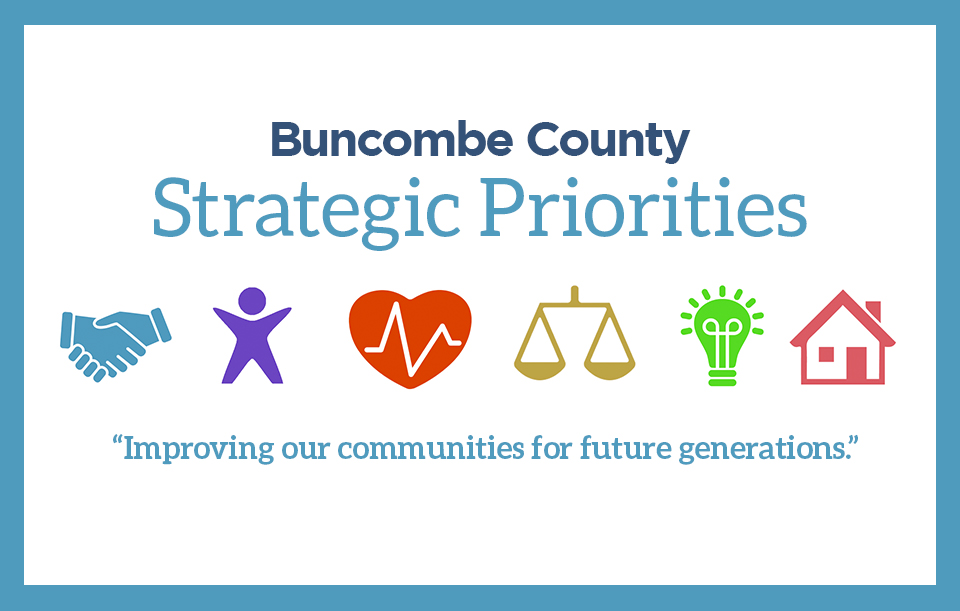This news item expired on Saturday, June 30, 2018 so the information below could be outdated or incorrect.

From filing a lawsuit against opioid manufacturers and distributors to creating more than 180 new preschool spots, this has been a productive and meaningful fiscal year for the Buncombe County Board of Commissioners. At the close of this fiscal year’s third quarter, Commissioners are pleased and excited to share significant progress on their six strategic priorities aimed at making substantive change. Through those six strategic priorities, Commissioners are creating new opportunities for residents in all corners of our County while ensuring a safe, healthy, well-educated and thriving community. These priorities cast a wide net tackling specific problems while also working collaboratively to create a foundation of future success for people across our community.
Included in the Commissioners’ strategic priorities are: Affordable Housing; Clean and Renewable Energy; Diverse Community Workforce; Early Childhood Education; Justice Resource Support; and Combating Opioid Addiction.
On the surface, it might not seem like early childhood education and affordable housing are connected. However, research shows creating early childhood education opportunities gives today’s kids a significantly greater opportunity of becoming tomorrow’s homeowners.
Commissioners are strengthening our community through these priorities by tackling problems, creating opportunities, and addressing a variety of issues County residents encounter in their day-to-day lives. Specific examples of this fiscal year’s successes include:
- Committed funding for Lee Walker Heights mixed-income redevelopment project which will include 212 affordable apartments.
- Funded Self-Help Home Homeownership and single-family home construction projects which will provide homeownership assistance for 20 families.
- Provided funding for home repairs for 35 households, in partnership with Mountain Housing Opportunities and Asheville Area Habitat for Humanity.
- Established goal of having all County operations run on renewable energy sources by 2030 and all community operations run on renewable energy within 25 years.
- Approved the establishment of a solar farm on the site of Buncombe County’s former landfill, in partnership with Duke Energy Progress.
- Provided funding for low-income residential weatherization and energy efficiency for 80 households.
- Created more than 180 new preschool slots at five different locations across the County.
- Provided funding for Partnership for Excellence in Early Childhood Education to establish a pipeline for developing professionals beginning in high school.
- Implemented trauma-informed strategies to child welfare, such as Project Broadcast to equip staff and community partners to better serve children.
- Tipping Point Grants distributed to 14 community-based organizations to create student support, job training, and other opportunities.
- Allocated economic development incentive funding to attract new and expanding businesses and jobs, in partnership with the Economic Development Coalition.
- Administered Skills Training and Employment Program to increase opportunities for recipients of public benefits, serving 73 students with vocational training resulting in 35 people gaining employment at an average pay of $11.49 per hour, in partnership with A-B Tech.
- Created the Justice Resource Center, a one-stop resource center for people involved in the justice system to access employment and other services, serving more than 500 people since opening in October 2017.
- Provided funding for Juvenile Misdemeanor Diversion Program to offer youth ages 16-17 facing potential arrest an opportunity to engage in programming rather than enter the criminal justice system, serving 60 youth year to date.
- Continued provision of in-kind facility for operation of Family Justice Center people experiencing domestic violence or sexual assault, serving nearly 700 people since opening in 2016.
- Became the first County in North Carolina to file a public nuisance lawsuit against the drug manufacturers and wholesale drug distributors that made the opioid epidemic possible.
- Held opioid town hall conversations and community listening sessions in locations across the county, with more than 300 people learning about the dangers of opioid addiction.
- Provided funding for the creation of a ABBA’s House, a 14-room transitional housing option for new mothers in recovery.
Please see the attached document for a complete line item of how our Commissioners’ commitment to the community via their strategic priorities are making Buncombe County a healthy, safe, well-educated, and thriving community.